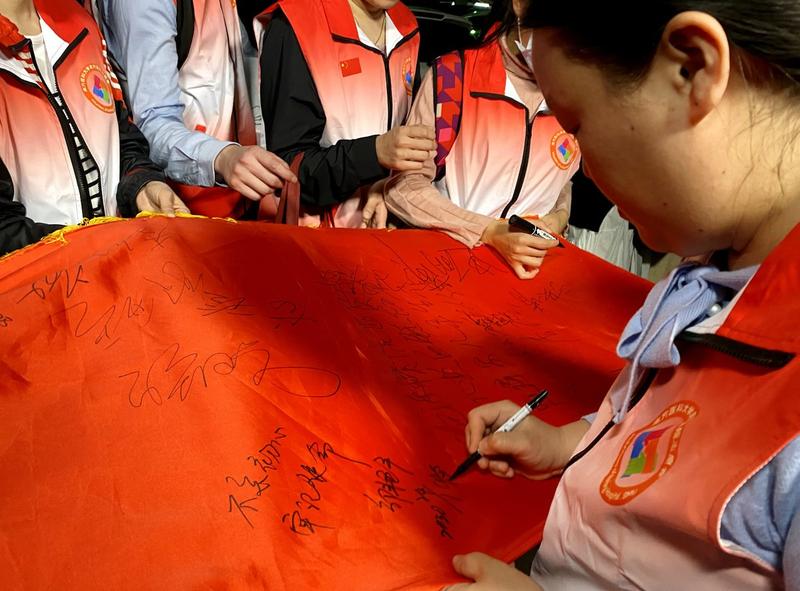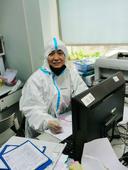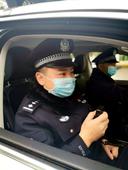We will fight to win
 Medics sign a banner. (PHOTO PROVIDED TO CHINA DAILY)
Medics sign a banner. (PHOTO PROVIDED TO CHINA DAILY)
A written request to help fight the novel coronavirus, made by members of the Xiaotangshan medical team at the former First Military Medical University-now part of Nanfang Hospital in Guangzhou, Guangdong province-on Jan 23.The team members referred to their old hospital's name to emphasize their experience and abilities.
Dear Party Committee of Nanfang Hospital.
We were members of the Nanfang Hospital medical team that was sent to Beijing's Xiaotangshan Hospital (an "instant infirmary" built quickly to treat patients infected with severe acute respiratory syndrome) in 2003 to fight SARS. That year, we made our due contribution to the national fight against SARS, and we managed to ensure that no medical personnel became infected.
Now, 17 years later, people across the country are facing the ravages of the new coronavirus. So, as a group with rich experience that defeated SARS, we are duty-bound to help!
We hereby apply to the Party Committee of the hospital to allow us to help fight the new epidemic. We are ready to be at your disposal at any time, and every team member is willing to go to the front line to make a contribution.
Here, we actively ask to join the fight against the epidemic, if the need arises. We will answer the call to serve and will fight to win!
I want to ease the burden on other doctors
 Zhang Zhan in her office. (PHOTO PROVIDED TO CHINA DAILY)
Zhang Zhan in her office. (PHOTO PROVIDED TO CHINA DAILY)
Application from Zhang Zhan, physician in the Department of Respiratory and Critical Care Medicine of Renmin Hospital at Wuhan University, on Jan 18.
In the war against an invisible enemy, no one will be spared! I am applying for a long-stay position in the observation room to carry out examination-and-sorting work on patients. That would reduce the need for constant in-hospital consultations, which would ease the burden on other doctors.
In addition, patients could receive continuous treatment, so beds in the observation room would be available for others in need.
If the hospital's leaders agree, please ask Professor Hu not to arrange any duties for me in the department and also to suspend my specialist clinic.
In addition, please strengthen prevention and protection of the observation room and regularize the arrangements with subordinate doctors in the observation room to prevent them from participating in tasks such as initial inspections and attending meetings.
I didn't tell Mingchang (Zhang's husband, Li Mingchang, deputy director of the first Department of Neurosurgery of Renmin Hospital at Wuhan University) about my decision. I don't think it's necessary, because as a doctor, the battlefield can be everywhere!
In 1918, Spanish flu killed tens of millions of people. After many years, it was concluded that the virus was the primary cause of the deaths, but the panic it engendered prompted many people to rush to hospitals, where they became infected. That resulted in a large number of deaths.
This is not the first time a variant of the respiratory virus has infected humans, nor will it be the last. So, there is no need to panic, and clinicians today have far more extensive and better clinical experience than ever before.
Doctors and police officers shoulder great responsibilities
 Police officer Guo Cong uses a walkie-talkie in his police car. (PHOTO PROVIDED TO CHINA DAILY)
Police officer Guo Cong uses a walkie-talkie in his police car. (PHOTO PROVIDED TO CHINA DAILY)
Written request for permission to officially join a publicity campaign, made by Guo Cong, a police officer in Liupanshui, Guizhou province, on Jan 30.
I am a policeman with the Economic Investigation Bureau of the (Liupanshui) Municipal Public Security Bureau. My wife is chief inspection physician of the Clinical Laboratory Department at Liupanshui People's Hospital. Our first child is 3 years old, and my wife is nearly 70 days pregnant with our second, which I hope will be a boy. She offered to go to Wuhan (Hubei province) to fight the epidemic, but approval was withheld because of her pregnancy, so she has blamed me as the "archcriminal" responsible for stopping her combating the disease in the epicenter of the outbreak.
Today, the sixth day of China's Lunar New Year, is the fourth day I have participated (unofficially) in street patrols and publicity for the youth commandos of the municipal PSB.
It also is the sixth day my wife has stayed at her post to assess specimens of the virus, and the seventh day of the local government's required quarantine and observation period following the outbreak.
In fact, I took the initiative to apply to take part in the street patrols and publicity because of my wife. I thought, "Why can't I-the head of the family and also a police officer-help control the epidemic, given that my pregnant wife can."
Compared with my simple, direct patrol, which starts at 9 am and ends at 8 pm, my wife deals with hundreds of samples every day.
She not only has to examine them and assess the results accurately, but also needs to take care to protect herself and our baby.
The intensity of her work means she is under far greater strain than me, which really worries me. But, because of her responsibilities, I have to understand and support her. After all, doctors and police officers both shoulder great responsibilities.
That's the reason I am applying to join the street patrol publicity team. On the one hand, I need to shoulder my responsibilities, and on the other, I hope to reduce the number of infected people through the campaign.
I know that as long as there is one fewer infected or suspected case, my wife will have one fewer potentially infected case to deal with, which will reduce the risk of her becoming infected.
I firmly believe this: As my wife and I fight side by side, the policemen and doctors will fight side by side, and all the people will fight side by side, and we will be able to win the battle against the epidemic as quickly as possible.


